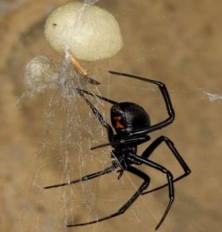
I remember a New Yorker cartoon from a few years ago in which a female praying mantises was wooing a potential mate. “After we have sex,” she tells him, “but before I eat you, I want you to help me move some furniture.” Mantids are famously post-coitally cannibalistic; another well-known mate-eating arthropod, the female black widow spider, doesn’t indulge so frequently. But the risk of being eaten, unsurprisingly, is a real turn-off for male black widows. (small, dun-colored, and lacking a dangerous bite, these guys already get no respect.) Then what’s a mate-seeking female black widow to do? Chad Johnson, a behavorial ecologist at Arizona State University, noticed that the females frequently left uneaten food hanging in their webs. Johnson was puzzled by the seemingly wanton excess�until he observed that males seemed to mate more frequently with females whose larders were full. When convinced that the female in question wasn’t hungry, Johnson reasoned, a male is more likely to risk a rendezvous.
The ecological implications go beyond our cringing amusement with the sexual mores of simpler species. It’s a classic piece of folk ecology that animal predators, unlike humans, don’t kill wastefully or wantonly. Ecologists tend to accept this wisdom as a rule, reasoning that the risk and energy costs of predation mandate a parsimonious approach. But as Johnson and his coauthors argue in a forthcoming article in the journal Ethology, what looks like the black widow’s careless housekeeping is actually a cagey way to attract a mate, offsetting wasteful predation by securing the chance to pass genes on to the next generation. And perhaps in return, that beleaguered male will get the chance to move the sofa closer to the window. �via New Scientist
 Gearfuse Technology, Science, Culture & More
Gearfuse Technology, Science, Culture & More

